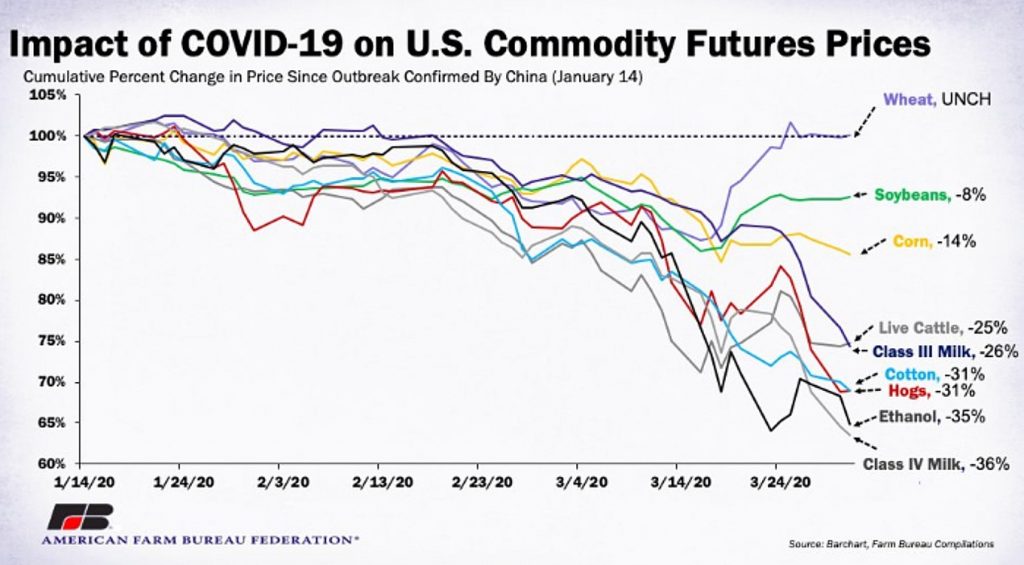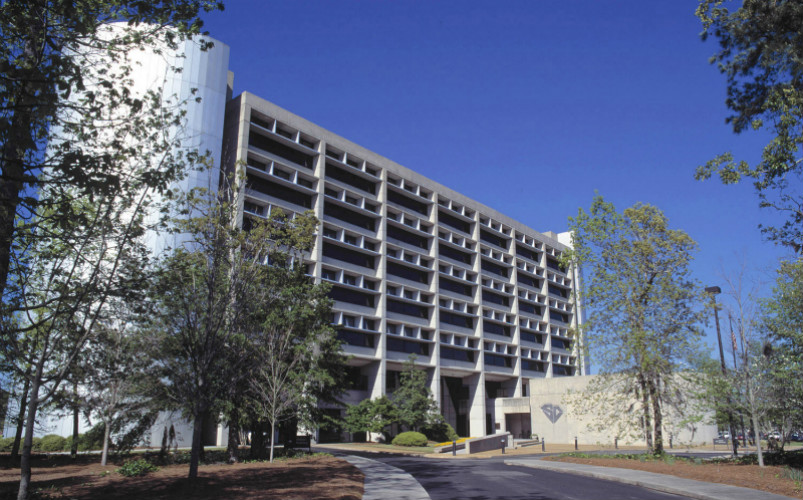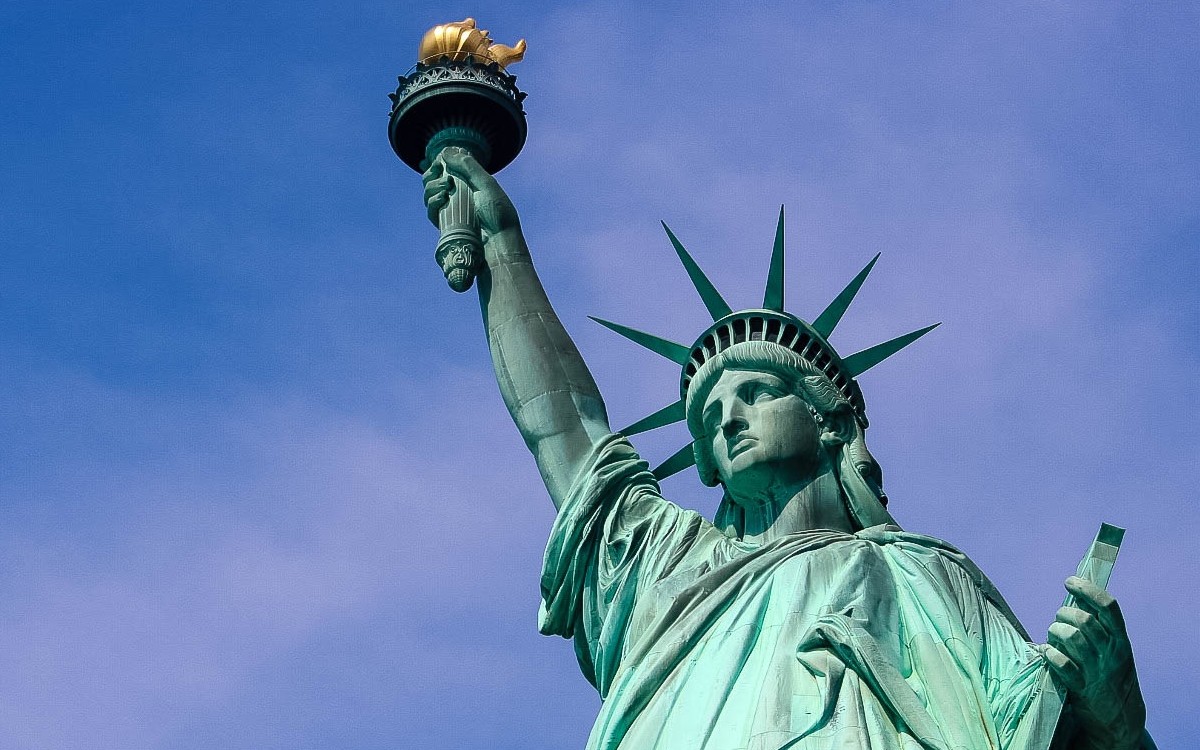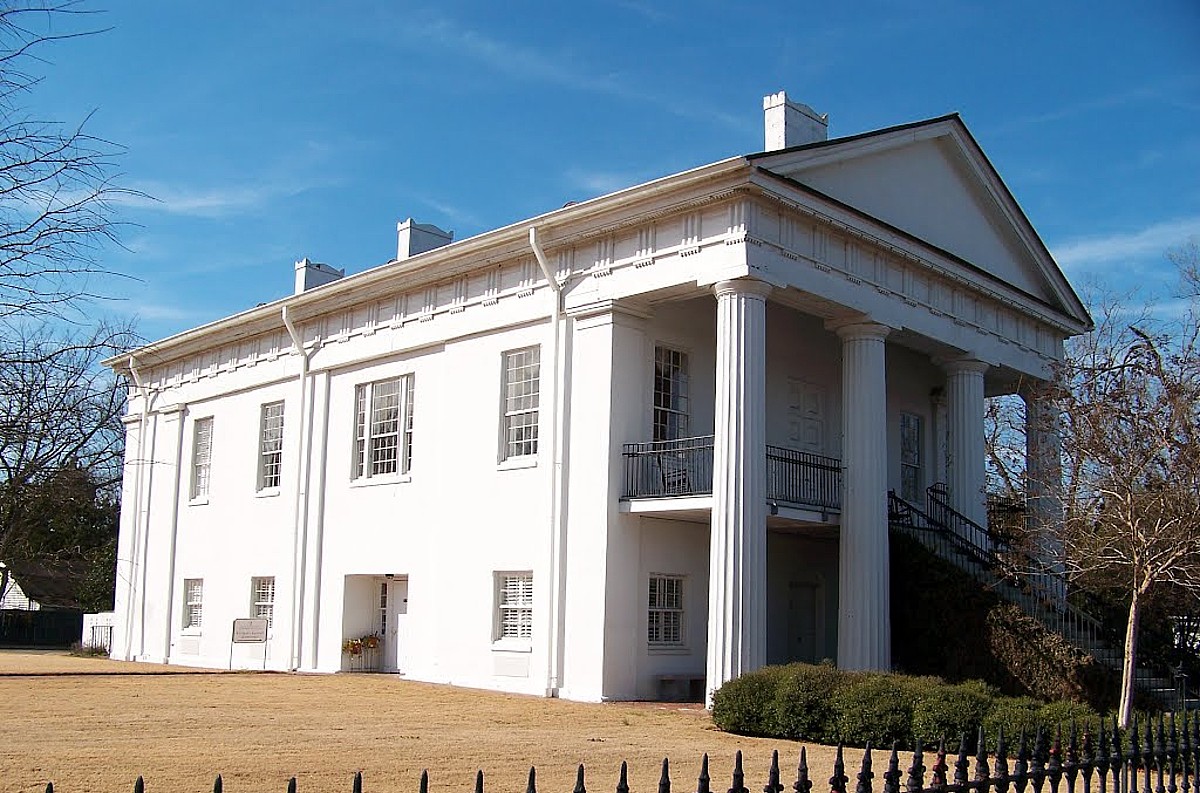INSIDE ISSUE 19.15 | April 10, 2020
 BIG STORY: Farmers in S.C. face an uncertain future
BIG STORY: Farmers in S.C. face an uncertain future
NEWS BRIEFS: Santee Cooper debate derails pandemic funding, budget
COMMENTARY, Brack: We can do better for all
SPOTLIGHT: AT&T
FEEDBACK: Questions for our governor
MYSTERY PHOTO: Classic white building
BIG STORY: Farmers in S.C. face an uncertain future

By Lindsay Street, Statehouse correspondent | The shuttering of restaurants and schools has lashed South Carolina farmers. The exact toll will be unknown for months but some fear the downturn in markets from the coronavirus pandemic will cause farms already on the edge to suffer or close.

“The last five years have been insane,” said Clemson University agribusiness professor Adam J. Kantrovich said. “Hurricanes, freezes, the trade war and now this.”
He said the state’s response to the coronavirus pandemic and potentially the virus itself added more hurt that may not be relieved by aid packages.
- As the trade war waged in 2019, delinquencies on South Carolina farms increased as some weighed hard realities. See our August 2019 coverage here.
Some federal aid is already expected for farmers, but state disaster aid was held up after a one-day legislative session this week ended without an agreement on funding state government or releasing $180 million in pandemic aid.
But amid the challenges, there could also be opportunity to strengthen and bolster locally grown foods, according to Kantrovich and South Carolina Farm Bureau media liaison Stephanie Sox.
On the farm
An updated analysis by the American Farm Bureau Federation shows crop and livestock prices falling to levels that “threaten the livelihoods of many U.S. farmers and ranchers.”
 The federation said the closing of schools and restaurants has led to a “downward spiral” in crop and livestock prices. It reported this week that corn prices since January are down 15 percent, soybean prices are down 10 percent, and cotton is down nearly 30 percent. Beef, pork and milk prices are all down around 30 percent.
The federation said the closing of schools and restaurants has led to a “downward spiral” in crop and livestock prices. It reported this week that corn prices since January are down 15 percent, soybean prices are down 10 percent, and cotton is down nearly 30 percent. Beef, pork and milk prices are all down around 30 percent.
Kantrovich said hard numbers on farm closures will not be available for months, but he already knows of dairy farms lost this year in South Carolina. Sox addedmany wholesalers and direct-to-consumer farms in the state have been “creative and resourceful on finding new markets.”
For example, Senn Brothers Produce’s Jake Senn said the West Columbia distributor was split evenly between retail and restaurant, but all that has changed in the last month.
“People will always eat, people have to eat. Where the restaurant business fell, our retail business grew,” Senn said, adding that despite retail increasing, many staff members had to be reduced to part-time and a handful were laid off.
- Buy it fresh: The S.C. Department of Agriculture has launched a list of farms, wholesalers and markets offering direct-to-consumer sales. See the list here.
Labor and health
Two major issues that will determine the ultimate impact of the pandemic on farmers are access to labor and access to health care, according to Kantrovich.
In the last decade, many farms in the state have used temporary workers from foreign nations, known as H-2A workers. Federal authorization allowed South Carolina about 6,000 of these nonimmigrant workers in 2019, Kantrovich said. He said these workers are vital to keeping farms running in the state since local labor appears unwilling to do the work at the pay offered.
But foreign labor is vulnerable for two reasons, he said. First, the housing is typically dormitory style where disease can spread easily if picked up on a trip to town and, second, foreign countries that supply the laborers could close borders in the pandemic — leading to a worker shortage in the state.
That leaves farmers wondering whether they can plant or harvest, and if they do, risking a sickened workforce. Or sickening themselves or family.
“It is a significant concern,” Kantrovich said, adding it has been a concern nationwide among farmers. “(But) these farmers are willing to put themselves up to do what they need to do.”
South Carolina’s farmers are also similar to peers elsewhere in the nation: they live in rural areas with limited access to health care and, on average, are pushing 60-years-old. In other words, they are among the people most at risk from dying from COVID-19.
“They are much more susceptible to being harmed by the virus itself and in essence are risking death (by continuing to farm),” Kantrovich said.
And with the added stress of lost income, there is another pandemic surging for farmers: mental health. Kantrovich and Sox said initiatives are forming in the state to help.
‘There is opportunity’
Amid all the concerns, however, there is a conversation about reforming the industry. Sox said discussions about making agriculture more resilient has been ongoing for decades.

“Agriculture as a whole is probably one of the most progressive industries in the world and farmers have found a way over and over and over to respond to environmental needs, respond to consumer demands and doing it all with less land, less resources through technologies,” Sox said. “They have always met that change head on.”
But there are some obstacles.
Kantrovich said a “middle ground” needs to be found between cheap imported food and locally-grown food, adding that some of it will come down to consumer expectations on availability and cost.
Senn said local produce can cost up to 40 percent more than imported produce. And most of that additional cost is due to labor, according to Kantrovich. He said the industry needs federal-level legislation and policy changes, and possibly subsidies at the state level to help it compete.
Already, consumers appear to be shifting choices when it comes to food, such as buying directly from farmers, raising their own chickens or starting a garden. Kantrovich said the more people get interested in growing their own food, the more they are likely to support locally-grown food.
“I hope folks will remember that buying local and supporting local is important even if we’re not in the middle of a pandemic,” Cox added.
- Have a comment? Send to: feedback@statehousereport.com
Santee Cooper debate derails pandemic funding, budget

By Lindsay Street, Statehouse correspondent | At least one more legislative day is needed to release $180 million in state disaster response to the coronavirus pandemic and to continue funding the government beyond the end of the June 30 fiscal year.
State legislators met April 8 in a one-day session after weeks of staying away from Columbia to curb the spread of the coronavirus. In an effort to release aid money and pass a budget before the May 14 end of session, the House and Senate agreed to meet before the virus’ predicted peak in the state.
But after the Senate debated on a provision in the continuing resolution that barred state-owned utility Santee Cooper from entering into long-term contracts, the House passed its own continuing resolution and adjourned. The Senate then passed its version of the continuing resolution and adjourned. Now one body or the other must return to concur with or amend the other chamber’s version. According to staff, there are no major differences, just minor tweaks to work out.

Nicolette Walters, spokesman for House Speaker Jay Lucas, R-Hartsville, said Thursday her boss has not issued a comment on recalling lawmakers to Columbia. Another bill that would allow lawmakers to pass limited items after the official end of session, known as sine die, was only passed in the Senate, leaving it up for House approval.
The budget resolutions ended up including the language on Santee Cooper, which has been under evaluation for sale or reform by the legislature for more than two years following a very public multi-billion debacle related to nuclear plant construction.
Both measures would have set aside $200 million for relief, of which $20 million would be for natural disaster response such as a hurricane. The other $180 million would be used at the governor’s discretion following the Joint Bond Review Committee’s recommendations on coronavirus pandemic. That committee, which includes high-ranking legislative members from both chambers, can make decisions and recommendations via polling members remotely.
Of the money, $15 million has been earmarked for elections in the state, likely for helping poll workers with personal protection equipment such as masks, gloves and shields.
The resolutions also would suspend teacher annual pay increases to avoid unfunded mandates on districts. Teachers will receive the same pay as they did in the 2019-2020 budget. But the pay increases are expected to return once the 2020-2021 budget is passed later this year.
That budget, which will likely work off of a $1.2 billion decrease in revenues from the pandemic, will be drafted when it is determined for groups to meet safely again.
Also in recent news:
More drama about Santee Cooper. The budget-funding resolutions both include language barring the state-owned utility from entering long-term contracts and keeps the option for legislators to determine whether it is sold or reformed. Then, on Wednesday, S.C. House Speaker Jay Lucas, R-Hartsville, released a letter accusing the utility of spreading misinformation. Santee Cooper spokeswoman Mollie Gore responded some information was sent out “prematurely” and acknowledged the mistake. On Thursday, Lucas and others sent a formal public records request for correspondence between the utility and lawmakers.
About those gun-store exemptions in executive orders. What do gun shops and grocery stores have in common? According to Gov. Henry McMaster’s “home or work” order this week, both are permitted to stay open during the current public health crisis. This week, reporter Heath Ellison at the Charleston City Paper took a hard look at why gun stores are allowed to keep operating. The purported reason is in part due to a Department of Homeland Security guidance that exempts gun stores from closures. Read more.
- Have a comment? Send to: feedback@statehousereport.com
Friends and readers,
 This coronavirus crisis is dealing a blow to everyone. But South Carolinians will get through it, just like we get through hurricanes and other disasters.
This coronavirus crisis is dealing a blow to everyone. But South Carolinians will get through it, just like we get through hurricanes and other disasters.
We’re proud to offer Statehouse Report for free. For more than a dozen years, we’ve been the go-to place for insightful independent policy and political news and views in the Palmetto State. And we love it as much as you do.
But now, we can use your help. If you’ve been thinking of contributing to Statehouse Report over the years, now would be a great time to contribute as we deal with the crisis. In advance, thank you.
— Andy Brack, editor and publisher
BRACK: We can do better for all

By Andy Brack, editor and publisher | So what happens when Americans start getting their $1,200 federal coronavirus checks or small business owners start receiving tens of thousands of dollars of rescue money?
 Will they finally wake up and realize government isn’t the enemy, despite four decades of self-serving GOP rhetoric dedicated to drowning it in a bathtub? Will they finally remove political blinders and realize an ideology devoted to personal wealth and greed has hoodwinked them and taken away countless opportunities?
Will they finally wake up and realize government isn’t the enemy, despite four decades of self-serving GOP rhetoric dedicated to drowning it in a bathtub? Will they finally remove political blinders and realize an ideology devoted to personal wealth and greed has hoodwinked them and taken away countless opportunities?
Maybe, but doubtful. The powerful blather from Fox television, conservative think tanks, private clubs, golf courses and boardrooms is too strong to wither in one fell swoop of citizen frustration. But it’s coming, yes, change is coming. It’s just a shame that a pandemic afflicting millions may well be the root cause of a political revival of the common good.
In a prescient editorial published today, The New York Times observed, “The erosion of the American dream is not a result of laziness or a talent drought. Rather, opportunity has slipped away. The economic ladder is harder to climb; real incomes have stagnated for decades even as the costs of housing, education and health care have increased.”
In two decades of writing about South Carolina and her politics, one conclusion has been crystal clear: We can do better for our people. We can do better in providing more opportunities for families to realize their dreams. We can do better in strategies to thwart pervasive poverty, poor health, hunger and educational challenges that linger in the Palmetto State, decade after decade. We can do better by lifting up everyone, instead of using public policy to prefer those who tend to be white, rich or conservative. We can do better by focusing on policies that bear fruit for “we the people” — all of our people, not just the few.
You may not like that general conclusion. You may balk and get your back up. But let’s see whether you return the $1,200 check. Or if small business owners turn down aid. Or if you say no to Social Security, Medicare or cheap college loans. Or if you refuse to ride on roads built by the government or get it to stop taking away the trash from your yard.
Governments solve problems. In the 1920s after a world war, our federal government took action to improve food safety, protect the health and safety of industrialized workers, and extend voting to women. Then came Social Security and assorted New Deal programs to help the country grow from a depression.
After a second world war came the G.I. Bill, which opened educational opportunities to millions. Civil rights advances, as well as Great Society programs like Medicaid and Medicare, brought millions more out of poverty that stretched from the Civil War.
But in the 1980s, government became the bad guy, a punching bag for avaricious politicians who valued individual achievement over the common good. It didn’t help that government had become bloated and bureaucratic, the societal equivalent of an Edsel or K-Car.
Partisanship ensued. And it got worse as the tea party got trumped by, well, President Trump and his followers, hungry to hear how they were relevant even though GOP policies had left them behind.
As the Times opined, “Advocates of a minimalist conception of government claim they too are defenders of liberty. But theirs is a narrow and negative definition of freedom: the freedom from civic duty, from mutual obligation, from taxation. This impoverished view of freedom has in practice protected wealth and privilege.”
Democrats didn’t do much better in this whole political mess, often adopting the same cynical tactics used by Republicans to divide and try to conquer.
So now we’re at a point where the nation’s experiment in democracy is being demonized by a microbial invader. Government, quite rightly, is the only entity big enough — despite constant attempts to denude its legitimacy — to come to the rescue.
As it responds, people in government must look ahead at how it can provide more opportunities for everyone, not just the few. It’s time for leaders to be leaders for all. And if they can’t, bring on a new batch. Indeed, we can do better.
- Have a comment? Send to: feedback@statehousereport.com.
AT&T
 The public spiritedness of our underwriters allows us to bring Statehouse Report to you at no cost. Today’s featured underwriter is AT&T Inc.
The public spiritedness of our underwriters allows us to bring Statehouse Report to you at no cost. Today’s featured underwriter is AT&T Inc.
AT&T Inc. (NYSE:T) helps millions around the globe connect with leading entertainment, mobile, high speed Internet and voice services. We’re the world’s largest provider of pay TV. We have TV customers in the U.S. and 11 Latin American countries. We offer the best global coverage of any U.S. wireless provider*. And we help businesses worldwide serve their customers better with our mobility and highly secure cloud solutions.
- Additional information about AT&T products and services is available at http://about.att.com.
- Follow our news on Twitter at @ATT, on Facebook at http://www.facebook.com/att and YouTube at http://www.youtube.com/att.
* Global coverage claim based on offering discounted voice and data roaming; LTE roaming; voice roaming; and world-capable smartphone and tablets in more countries than any other U.S. based carrier. International service required. Coverage not available in all areas. Coverage may vary per country and be limited/restricted in some countries.
Questions for our governor
To the editor:
![]() Why doesn’t South Carolina have a plan for plasma donations? For antibody testing? For contact tracing? For additional testing?
Why doesn’t South Carolina have a plan for plasma donations? For antibody testing? For contact tracing? For additional testing?
Can we count on our state’s leadership to protect the elderly in nursing homes? North Carolina’s governor has ordered all nursing home personnel to wear masks. Why not us?
— Tom Ervin, Greenville, S.C.
NOTE: Ervin, a former state judge and member of the S.C. House, is a member of the S.C. Public Service Commission.
Homespun gov slow on virus leadership
To the editor:
Thanks to Statehouse Report as one of a number of independent media sources to press Gov. Henry McMaster in the right direction, even if his thinking has yet to evolve beyond the current toothless public safety declaration. I only hope it will not be a catastrophic [coronavirus] surge in South Carolina that finally introduced him face to face with the responsible mandates of emergency public health governance. As we’ve seen again and again in recent weeks, not everyone is mature or intelligent enough to catch onto the seriousness and pervasiveness of the threat — whether the threat to themselves, or the threat they may very easily and obliviously be to others.
The governor evidently prioritizes a homespun image of a man whose heart is in the right place — family values, the great outdoors and so on. He seems incapable of grasping that his order actually encourages the high-risk activity he should seek to strifle during this emergency (see: Raimondi of Rhode island; Lamont of Connecticut, and Northam of Virginia).
Here in Great Day country, though, if you’ve got the itch to go down to the playground for a little 3-on-3, fine! Gov. M apparently believes it’s a great idea to go out and “recreate.” And that long-awaited family reunion? Go for it without delay; the guv sees no reason to curtail family visits. Indoor church services? You might want to move your flock outdoors or online suggests our chief exec, but it’s apparently less than obvious to him whether those alternatives might actually be safer than just packing them into the pews, old-school.
In other words, if you’re not taking the pandemic seriously, far be it from Governor McMaster to rain on your parade. A lot of South Carolinians I know will claim that Henry’s just advocating that we use common sense. But does it not occur to them, or him, that the only people among us who still need a governor (for Pete’s sake!) to rein them in at this point in the outbreak may be those whose common sense abandoned them long since?
While on this topic, it’s quite evident that media attention had been critical to hospitals, mayors and governors in rounding up needed resources during the pandemic. Maybe the most lasting image from this outbreak will be of the stalwart Andrew Cuomo of New York, hanging tough at his daily briefings, defending and pleading on behalf of the people and institutions of his state.
Of course, we should all hope fervently that our situation here in South Carolina will not demand heroics quite on that scale. But as the inevitable surge in cases approaches smaller cities and rural areas, while numbers in cities like New York, New Orleans and Detroit level off and — we hope — begin to subside, we can only hope that media will cover the pandemic in flyover country vigor equal to what’s been the case for this crisis in “major media markets.” Here’s hoping we don’t lazily revert to the tedious mantra of Fake News, Fox, or indifference. (But of course we will!)
— Phil Snead, Charleston, S.C.
What do you think?
We love hearing from our readers and encourage you to share your opinions. But you’ve got to provide us with contact information so we can verify your letters. Letters to the editor are published weekly. We reserve the right to edit for length and clarity. Comments are limited to 250 words or less. Please include your name and contact information.
- Send your letters or comments to: feedback@statehousereport.com
Classic white building

Here’s a classic white building somewhere in South Carolina. Tell us where and what its significance might be. Send your best guess to feedback@statehousereport.com. And don’t forget to include your name and the town in which you live.
Our previous Mystery Photo
 Our April 3 image, “Old bridge,” is a photo of the 1898 hydroelectric plant at Gervais Street in Columbia on the Columbia Canal, as recognized by several alert readers: George Graf of Palmyra, Va.; Jay Altman of Columbia; Dale Rhodes of Richmond, Va.; Frank Bouknight of Summerville; Henry Eldridge of Tega Cay; Jacie Godfrey of Florence; David Lupo of Mount Pleasant; and Vic Carpenter of Lugoff, who remembers rafting past it years ago.
Our April 3 image, “Old bridge,” is a photo of the 1898 hydroelectric plant at Gervais Street in Columbia on the Columbia Canal, as recognized by several alert readers: George Graf of Palmyra, Va.; Jay Altman of Columbia; Dale Rhodes of Richmond, Va.; Frank Bouknight of Summerville; Henry Eldridge of Tega Cay; Jacie Godfrey of Florence; David Lupo of Mount Pleasant; and Vic Carpenter of Lugoff, who remembers rafting past it years ago.
Lupo shared, “The canal branches off of the Broad River and rejoins it after the Broad had merged with the Saluda to form the Congaree River. The Wikipedia article on the canal notes that the original canal was built in the 1820s to allow boats to avoid the rapids near the river junction. It was redesigned in the 1880s and rebuilt in its current location as a power source with a hydro-electric plant. The Columbia Canal is listed on the National Register of Historic Places.”
Graf added, “I read last year that the Columbia Canal — the main source of drinking water for a massive swath of the city, including the University of South Carolina, the downtown core, numerous hospitals and Fort Jackson — has not been repaired. The 60-foot wide breach in the western levee of the canal, along the Congaree River near the State Museum, is still there. Just north of the breach, a thick rock dam — one that governmental officials scrambled to put together in the days following the flood — still stands firm, holding in the river water that is later purified at the city’s Canal Treatment Plant and piped out to the city’s water customers. The canal … remains functional, but battered.”
- Send us a mystery: If you have a photo that you believe will stump readers, send it along (but make sure to tell us what it is because it may stump us too!) Send to: feedback@statehousereport.com and mark it as a photo submission. Thanks.
ABOUT STATEHOUSE REPORT
Statehouse Report, founded in 2001 as a weekly legislative forecast that informs readers about what is going to happen in South Carolina politics and policy, is provided to you at no charge every Friday.
Meet our team
- Editor and publisher: Andy Brack, 843.670.3996
- Statehouse correspondent: Lindsay Street
Buy the book
Now you can get a copy of editor and publisher Andy Brack’s We Can Do Better, South Carolina! ($14.99) as a paperback or as a Kindle book ($7.99). . The book of essays offers incisive commentaries by editor and publisher Andy Brack on the American South, the common good, vexing problems for the Palmetto State and interesting South Carolina leaders.
More
- Mailing address: Send inquiries by mail to: 1316 Rutledge Ave., Charleston, SC 29403
- Subscriptions are free: Click to subscribe.
- We hope you’ll keep receiving the great news and information from Statehouse Report, but if you need to unsubscribe, go to the bottom of the weekly email issue and follow the instructions. © 2020, Statehouse Report, a publication of City Paper Publishing, LLC. All rights reserved.
- Read our sister publications: Charleston City Paper (every Wednesday) | Charleston Currents (every Monday.















 We Can Do Better, South Carolina!
We Can Do Better, South Carolina!